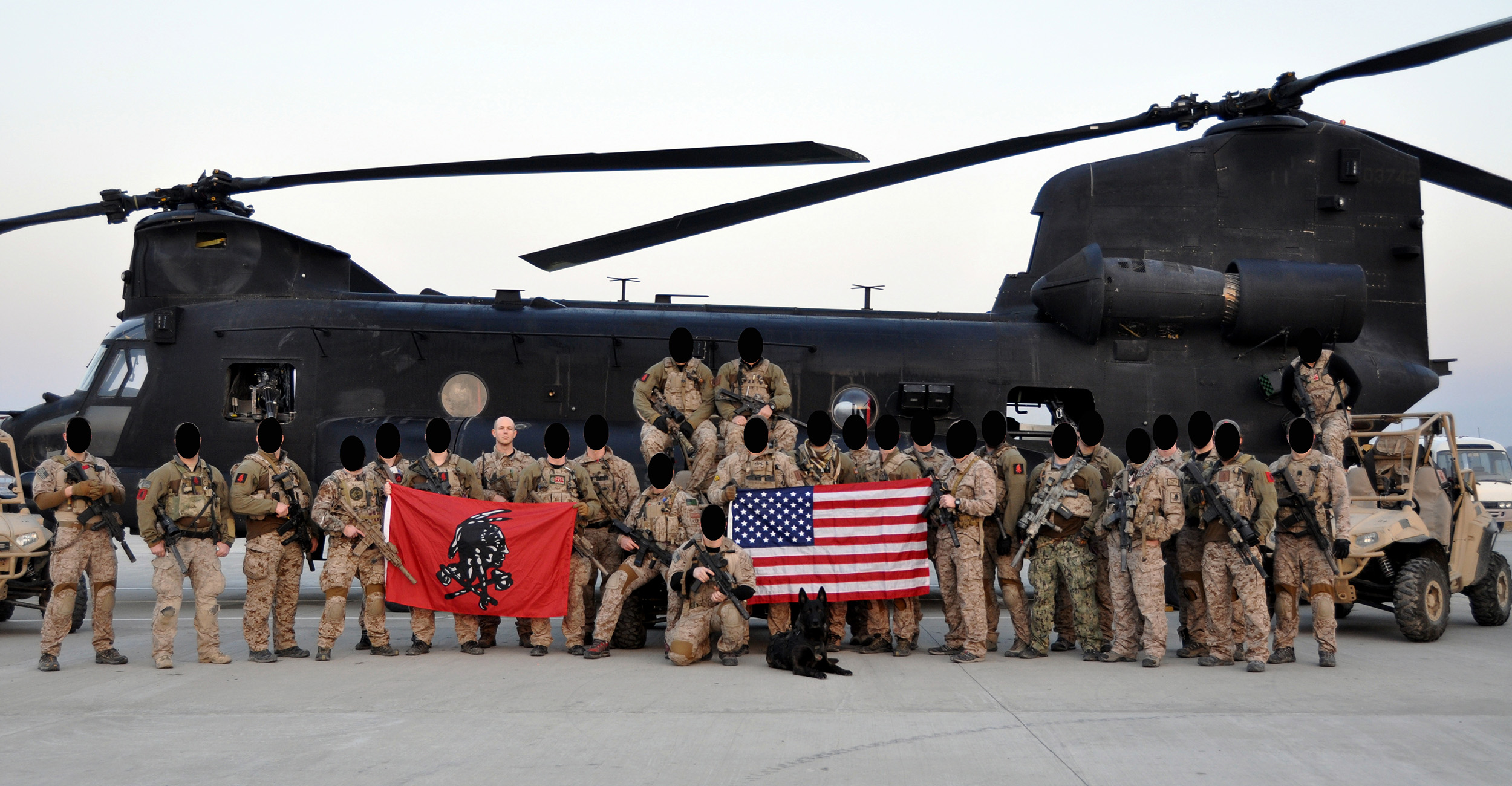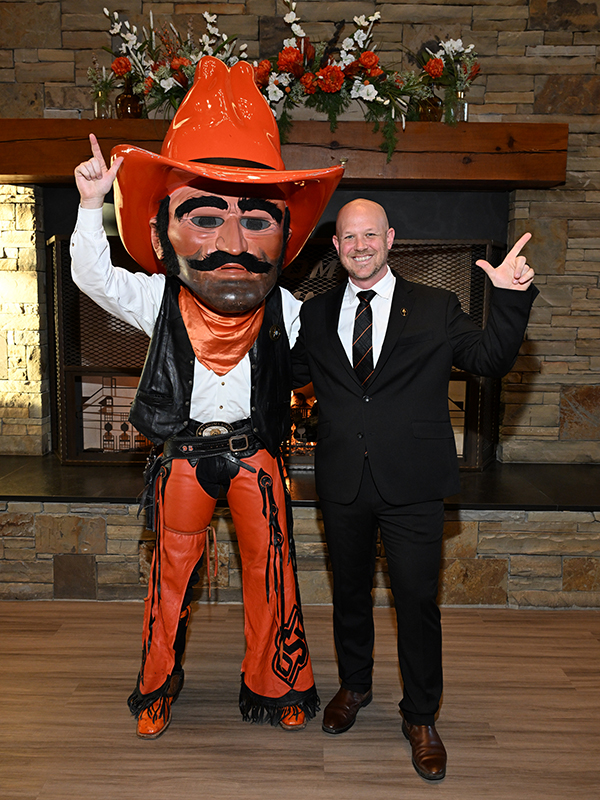
A team effort: Spears Business MIS alumnus’s journey from Stillwater to special forces, cybersecurity
Friday, June 21, 2024
Media Contact: Terry Tush | Director, Marketing and Communications | 405-744-2703 | terry.tush@okstate.edu
Jerrad Ackerman is no stranger to stressful situations.
After all, he was a tactical-communication specialist assigned to an assault squadron with the Naval Special Warfare Development Group, also known as DEVGRU or SEAL Team Six. But, walking into his own house one day in the spring of 2011 still ranks among his most nerve-wracking moments.
Less than a month earlier, he had returned home from a deployment that was supposed to be his last. Now, he was going to have to tell his wife, Allison, and their two young children that he was given another overseas assignment and would immediately be headed right back. He couldn’t tell them what this last-minute mission entailed, where he was headed or when he would return.
Allison knew Jerrad didn’t have a say in the matter, but she was still annoyed and disappointed. He was supposed to be done with these dangerous assignments.
She knew not to ask a lot of questions because his job carried geopolitical ramifications, but she always wanted to know the danger level of the assignment on a scale of 1-10. If things went according to plan, he said, this had a high probability of being a 10.
“That’s not my favorite thing to hear,” Allison said.
Breaking the news to their 3-year-old daughter was just as tough. Allison held their toddler in a rocking chair as the couple tried to explain why Jerrad would be leaving again soon. In Allison’s frustration, she blurted out a line that the couple laughs about to this day.
“What, it’s not like you guys found Osama bin Laden,” Allison said in the most mocking tone she could muster. Jerrad’s eyes got as big as saucers. A smile came over his face and he walked out of the room without saying a word.
The mastermind of the 9/11 terrorist attacks and the then most wanted man on Earth had been on the run for a decade. Some, Allison included, thought bin Laden might never be found, but U.S. operatives in Pakistan had located a compound where he was thought to be hiding. SEAL Team Six had been given the assignment to raid the compound and capture the al-Qaeda leader.
Time was of the essence.
Weeks went by without Allison hearing from Jerrad. On the morning of May 2, 2011, she woke up early with her daughter and flipped on the Weather Channel to check the day’s forecast. Instead of the weather, the network had a special report. American forces had raided a compound near Abbottabad, Pakistan, and bin Laden was dead.
Allison dropped to the floor.
“I didn’t know if Jerrad had lived through it,” she said. “All I knew was that it was done, and from the Weather Channel, of all places. I just laid on the floor next to my daughter.”
It would be 12 more hours before she would know for certain that Jerrad was alive. Hopefully, this would be the last assignment in a career that sounded like it came straight from the pages of a novel.
He remembers the terrorist attacks of Sept. 11, 2001, like they were yesterday.

Originally from Bartlesville, Oklahoma, Ackerman was a student at Oklahoma State University studying management information systems. He was glued to the TV in the Delta Tau Delta fraternity house dining room when United Airlines Flight 175 crashed into the World Trade Center’s South Tower. His father was also in Manhattan on business at the time, and Ackerman had no way to know if his dad was safe.
Watching the tragedy unfold, he knew he wanted to help in some way. How could he help protect America so this wouldn’t happen again?
“That was always one of those things that really resonated in my head through all the training courses or talking myself into jumping out of the back of a plane,” Ackerman said. “It’s what motivates you at the end of the day to go do stuff above and beyond. I saw it as more of a protection of the United States and for this next generation. If we can push them back, then we can create a safety net for our kids.”
Ackerman earned his MIS degree from the Spears School of Business in 2002. After taking some cybersecurity courses at the University of Tulsa, he found himself in an excellent job as the vice president for information technology at Kero-Jet Corporation near Houston.
Still, he felt a pull to serve his country in some way, and his first instinct was to become an FBI agent where he could put his background in information systems and IT to work.
However, a special agent at the Houston bureau told Ackerman he didn’t have enough life experience for the FBI. The best way to gain that experience was in the military, and the agent specifically urged Ackerman to pursue a special forces assignment.
Never one to back down from a challenge, Ackerman signed up for the Navy and headed for one of the most mentally and physically grueling programs on earth — Basic Underwater Demolition/SEAL training, also known as BUD/S. The attrition rate for BUD/S is around 75%, and unfortunately, Ackerman joined that figure when he suffered a major knee injury that ended his dream of becoming a SEAL. It was yet another setback, and now he faced months of knee rehabilitation at Coronado Island near San Diego.
Searching for his purpose in the Navy and in life, Ackerman met an officer named Joe Burns, who would change Ackerman’s trajectory during a rehab run. The two had never met before, but the former sniper and Navy SEAL listened to Ackerman’s story and saw a higher calling. Burns thought Ackerman might be a great candidate for a new assignment working alongside the SEALs in a communications support role. The officer quickly became a mentor and made some phone calls that changed Ackerman’s life forever.
“You’re going to run into people throughout your career that really make the difference,” Ackerman said. “We all need mentors. We don’t get there on our own. We get there by talking to people, engaging with people, letting people hear our story. And then they nudge you in the right direction. In my case, the direction was to a career path that I didn’t even know existed. If I can tell the next generation of students one thing, it’s that your life and career are a team effort.”
After a lengthy application and screening process, Ackerman reported to DEVGRU as a member of the special forces unit in 2007. While he wasn’t a Navy SEAL, he would be expected to keep up with his SEAL teammates in every way.
On top of doing his actual job, which consisted of establishing and maintaining tactical lines of communication with his teams and leadership during missions, he would be expected to suit up in the same body armor with over 100 pounds of gear, be able to fire the same rifle and navigate through the same swamps — only he had to be perfect or risk being sent home or reassigned.
“When you talk about a pressure cooker, this was it,” Ackerman said. “They’re always looking at you when you’re out on the missions with them, every night whenever you’re deployed. It’s like, ‘That guy better keep up.’ So, you had to be in as good or better shape than every single one of your teammates. It was just a requirement.”
Ackerman learned how to keep up. He deployed to Afghanistan four times and once to Africa over four and a half years with DEVGRU. He was a part of approximately 120 direct-action missions, including the biggest one to date in the global war on terror — the raid on bin Laden’s compound.
During these missions, Ackerman would sometimes get a seemingly impossible assignment that took outside-the-box thinking to execute. For example, the squadron commander would ask Ackerman to connect him with multiple battle locations, ships at sea and the White House, while also making sure that some members of the call couldn’t hear other parties due to sensitivity or security reasons.
Ackerman had extensive military network training, but these types of tasks weren’t in the textbooks. They required a clever problem solver to find a way to get the job done because the lives of his teammates depended on it.

When he got these types of assignments, Ackerman couldn’t help but think back to his MIS classes at OSU and how they prepared him for this moment. He recalls a class on Java, the programming language developed in the mid-1990s, where Ackerman solved a question but went about it in an inefficient way. The professor didn’t dock him for the mistake, but instead armed him with the ability to see that there are multiple ways to solve every problem.
Another time, Dr. Rick Wilson gave an unorthodox quiz where he told students to read every word on the page prior to answering a single question. The last line of the quiz said to simply write your name and turn in the paper. Wilson deducted points for every problem the students attempted. These moments in the MIS classes at OSU made a big impression on Ackerman, who understood that his professors were trying to show him a bigger picture.
“At the end of the day, the goal of our program is to create the next generation of problem solvers,” said Wilson, who is now the head of the OSU Department of Management Science and Information Systems. “Sometimes, in this field, we get bogged down in database applications, programming languages and all of these other tools, but that set of skills that you develop in solving problems is universal.
“When you’re faced with how to solve something in Afghanistan, it’s not about Tableau or Power BI. It’s about asking questions like, what do we control? What do we want to achieve? What constrains us? It’s about understanding that we have tools and asking how do we use them to solve the problem at hand? So, whether you’re a soldier, an HR director or the head of a winery, I want you to be able to think like a problem solver.”
Ackerman’s military career ended after that final deployment. He and Allison had a third child, a boy, and moved to Washington, D.C., where Ackerman was fortunate enough to work for all three intelligence agencies — the National Security Agency, the Central Intelligence Agency and the Defense Intelligence Agency — as a contractor in aspects of covert communications, clandestine communications, cybersecurity and offensive cyber operations.
He spent two years at Anduril Industries, one year at Modern Intelligence, and currently, he serves as the principal director of cybersecurity and classified networks at Draper, a nonprofit engineering and innovation company that serves America’s interests and security needs. Ackerman still gets to protect America and the world, just without bullets whizzing by his head.
Most of what he does at Draper is labeled classified or highly classified, but his team consists of 110 people all working to solve America’s toughest cybersecurity problems.
“It’s been a really good run,” Ackerman said. “I’ve met Elon Musk at the White House. I got a coin from Ukrainian President Volodymyr Zelenskyy. It’s just been this massive roller coaster ride.”
That ride also included induction in February into the OSU MSIS Cloud of Honor, which recognizes graduates that have distinguished themselves in their professional careers, displayed transformational leadership or made exemplary contributions to their communities.
To say the least, Ackerman checks all of those boxes, but he deflects the credit. Instead, he sees the honor as a reflection of the mentors and loved ones that helped him reach this stage. Allison, on the other hand, couldn’t have been happier that her husband’s achievements were recognized by a school that means so much to him.
“That ceremony was really the first time he shared his story publicly,” Allison said. “And to be able to share the night with all of us, his family, it meant so much to him.“For Jerrad, he had a plan for how he thought his life would go, and it really didn’t work out that way. God had other plans and was at work in his life, because if things had gone the way Jerrad wanted them to originally, he would never have done all these amazing things.”
Story by: Stephen Howard | Engage@Spears magazine
Photos by: Adam Luther and provided by Jerrad Ackerman
